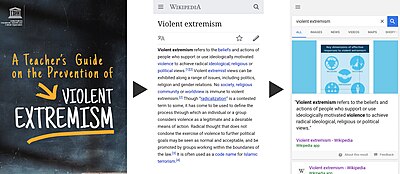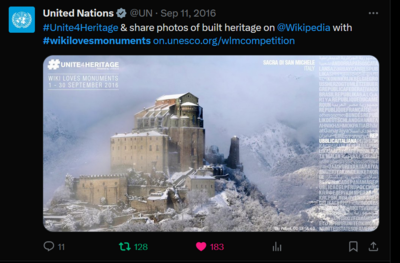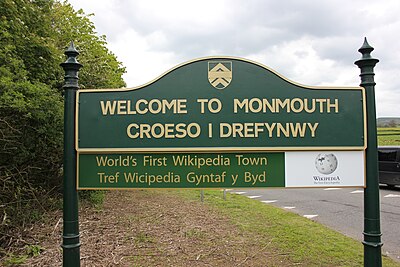User:John Cummings/test
Main
- UN images
Publish
- publish
- make all the links to all the headings
|
I work for Wikimedia Sverige, helping UN agencies and other international organisations share their knowledge and content on Wikimedia. I was Wikimedian in Residence at UNESCO for six years and before that at the Natural History Musuem and Science Museum in London. I also helped organise Wikimania 2014. I worked to advocate for free education, for policy change and to help UN agencies and other international organisations share their knowledge and content on Wikipedia. I am a certified coach and have been a staff member for the youth leadership charity WYSE International for ten years. I am a certified coach, I have completed the TPC Leadership programme, acreddited by ICF and EMCC. |

| ||
A summary of my work
 AdvocacyA large part of my role was advocating for better public education through policy change. This involved convincing UN bodies to change their copyright policies, to stop charging for their publications and spend time and money working with Wikipedia. I designed and ran projects with UNESCO, World Health Organization, FAO, UNEP, UN Human Rights Office, UN Population Fund, UN Women, WIPO and the International Energy Agency. I worked with heads of sections and directors, UN delegations and ambassadors. I explained concepts outside their area of expertise, understood what inspired them, connected the work to their values and led them through the process of how to make the policy changes. |
Copyright policy change with several UN agencies
Presentations about Wikipedia
Wikipedia official comment on the UNESCO Open Education Recommendation
Wiki4Women: a UN led project for better representation of women on Wikipedia
Mobile Learning Week booth
Wikimania 2014 community village
Wikipedia training events
PartnershipsMy work focussed on relationship building, finding shared goals between organisations and designing projects that benefitted all partners. This work involved developing proposals and running my own projects with UN agencies. I also supported many other Wikipedia staff to work with the UN through introductions, information, running events and using connections to navigate bureaucracy. I know many of the heads of publishing across the UN well. |
Sharing the UN’s most important messages about COVID on Wikipedia
FindingGLAMs: the first worldwide map of cultural heritage institutions
Connected Open Heritage: cultural heritage at risk on Wikipedia
Generating a Wikipedia article for every known species using datasets
Wikidata for Education: Linking syllabi to education resources for students out of school during COVID
UN text on Wikipedia
UN images on Wikipedia
UN data on Wikipedia and Google
Wikiproject United Nations
ActionAid: Reflection-Action consultancy
Strategy and planningI have planned most of the work Wikipedia has done with the UN, I’ve planned multi year projects with several UN agencies, convinced them to fund them and have written several formal partnership agreements. I came up with the idea of Wikipedian in Residence at UNESCO (the first Wikipedia position in an Intergovernmental Organisation) and found the funding to run the project for 6 years. My grant was the most Wikipedia community supported funding application of any project they have funded. I also wrote part of the Wikipedia 2030 strategy for partnerships. |
Wikipedian in Residence project planning
Wikimedia 2030 strategy
Partnership agreements
WYSE International website
Community organisingI have a lot of experience working with large international communities to help them solve problems. I have written much of the user documentation for Wikidata (Wikipedia’s database) through research and working with experts to explain complicated concepts and solve structural issues. I’ve been a staff member for the youth leadership charity WYSE International for 10 years, a very large international network of young people who are working towards global goals. I have produced several communication campaigns, including social media campaigns with UN agencies. |
UN agencies promoting Wikipedia photography competitions on social media
Fundraising
WYSE International staff
Coaching
Wiki Loves Earth Biosphere Reserves and Global Geoparks
Collaborating with UNEP to allow most countries to take part in Wiki Loves Earth
Wiki Loves Earth Malta
Monmouthpedia
Writing documentation to solve community issues
Other documentation
 Wikipedia articlesI have written 100s of articles on a wide range of topics including developing ways to generate articles from data from reliable sources. I've written on topics including; Plants, environment, people, organisations, companies, products, animals, places and concepts.
My work in detail
Copyright policy change with several UN agencies
I have convinced and supported many UN agencies to release some or all of their content under an open licence, allowing everyone to use and share their content including Wikipedia. This was the first time any of these agencies had changed their copyright policies, often despite a loss of revenue and sense of loss of control of the content. The work involved connecting people to a sense of purpose and a larger narrative around the value of public education and connecting to their values around fairness and opportunity. There was also an element of trust in my ability to help them through the process. This was done through:
Presentations about Wikipedia
United Nations Wikipedia audience
Wikipedia official comment on the UNESCO Open Education Recommendation
The UNESCO Open Education Recommendation (the highest level of international policy document UNESCO has) is an agreement by all governments that all teaching, learning and research materials in any medium produced by governments will be made available at no-cost access, use, adaptation and redistribution. I was able to get the Wikimedia Foundation (the charity that hosts Wikipedia) invited to the consultation, all of Wikipedia’s feedback was integrated into the final recommendation.
Wiki4Women: the first UN led project for better representation of women on Wikipedia
Wiki4Women was an International Women's Day event with 200 people attending each year to write about women on Wikipedia. It ran in 2018 and 2019 and included UNESCO delegations and ambassadors and the Director General speaking at the event. It was the first large collaboration between Wikipedia and the UN over several agencies and sites. It helped to raise awareness of the lack of representation of women in the media and allowed us to make connections with UN delegations which we used later for the FindingGLAMs project. I proposed the event to the head of outreach at UNESCO and was one of the main organisers for it and created the website. In 2019 several satellite events were held by other UN agencies in Bangkok, New Delhi, Almaty, Cairo, Lima, and Buenos Aires which I supported by helping the Wikipedia volunteers understand how to work with the UN.
Mobile Learning Week booth
Mobile Learning Week is the largest UN education conference, attended by education professionals, ministers and heads of state. I organised the Wikipedia booth for two years, including all the materials. I convinced the conference organising team to provide a booth after the application deadline and to waive the 10,000 euro fee. I collated the materials for the booth, I supported other Wikipedia staff to attend and to apply to deliver talks and connected them with UNESCO staff to meet with. I wrote a guide for running Wikipedia stalls at conferences to help others run stalls at events.
Wikimania 2014 community village
I organised the Community Village at Wikimania 2014 (Wikipedias annual conference). I brought in a much wider range of open source projects beyond Wikipedia. The 35 booths helped build collaboration between different groups. I also organised all the attendee materials and ran logistical support throughout the conference.
Wikipedia training events
I’ve run 10s of workshops for different professional groups to learn how to contribute to Wikipedia including:
Sharing the UN’s most important messages about COVID on Wikipedia
During the pandemic many UN organisations were producing public information about COVID but it was often not reaching a large audience. Millions of people were reading about COVID every day on Wikipedia but Wikipedia contributors were mainly focussed on the medical aspects of the pandemic leaving many topics undocumented. I created a project to work with staff members from several UN agencies (UN Food and Agriculture Organization (FAO, UN Women, UNFPA and UNESCO) and designed a process for them share their most important messages about COVID on Wikipedia. In total 50 paragraphs of information were added to Wikipedia articles which were viewed over 5.4 million times a year across 5 languages.
List of articles that were created or expanded during the project:
FindingGLAMs: the first worldwide map of cultural heritage institutions
I was one of 4 people working on the FindingGLAMs project to create the first worldwide map and database of cultural heritage institutions. The project worked towards making all country's cultural heritage available online through Wikidata (Wikipedia’s database). The database is a free public resource for citizens, educators and people protecting cultural heritage after disasters. The project was an official collaboration between UNESCO and Wikipedia with Wikipedia providing the network, technical knowledge infrastructure and audience and UNESCO, the subject expertise, contacts and government delegations. The project imported data on around 35,000 institutions (adding to the 50,000 on Wikipedia). I was the main non technical person working on the project, my work included:
Connected Open Heritage: documenting cultural heritage at risk on Wikipedia
The project collated information and photos of cultural heritage at risk around the world and made them available for free on Wikipedia. It also included a photography exhibition in 12 locations including UNESCO headquarters and the United Nations Office at Geneva.
Generating a Wikipedia article for every known species using datasets
Wikipedia articles are written by hand, 400,000 articles about species have been created over 20 years but there are around 1.9 million species known to science. I created a project to generate Wikipedia articles for all species using external datasets, at least a 550% increase of species articles and an increase of the size of English Wikipedia by 25% overall.
Wikidata for Education: Linking syllabi to education resources for students out of school during COVID
During the first wave of COVID 94% of students worldwide had their schools and universities closed and in most countries governments were providing very little education even if students had internet access.
UN text on Wikipedia
I created all the documentation, community consultation and technical work to allow open licence text from any source to be used on Wikipedia and understand how many times it was viewed. I also created a process to systematically scrape information from any blog or other large source of text and include that information in Wikipedia. Several UN agencies and others have used this work to add their knowledge to Wikipedia. Over 50% of these Wikipedia articles are the first result on Google Search and there was no drop in publication downloads meaning a new audience was created for the work.
UN images on Wikipedia
The UN produces 100,000s of images, many of which are unique. After I worked with several UN agencies to openly licence their content I was able to make the images available on Wikipedia so they could be used in articles. I did the technical work, set up all the metrics tools, uploaded all the initial content and worked with a developer to upload the bulk of the images.
UN data on Wikipedia and Google
I worked with several agencies to share their data on Wikidata, (Wikipedia’s database) including:
Wikiproject United Nations
I wrote the central collaboration portal between the UN and Wikipedia. It was the first ‘Wikiproject’ to span multiple different sites, allowing a wider range of projects to be done. The site serves two audiences:
ActionAid: Reflection-Action consultancy
Myself and Dr Lucie Kaffee were contracted by ActionAid to create a stakeholder map, analysis report and recommendations for their community education website Reflection-Action. The research project examined how to organise their field knowledge online to better educate their staff to deliver their work.
Wikipedian in Residence project planning
I’ve worked with senior staff in many UN agencies to design project plans for working with Wikipedia based on their goals. These plans were funded by the European Investment Bank, WIPO, UNDP South Africa, UNESCO and the UN Office for Human Rights to recruit staff to run projects. I helped design the job description and was on the interview panel for a number of them.
Wikimedia 2030 strategy
I was one of 8 people in the Partnerships Working Group for the 2030 Wikimedia Strategy, many of our recommendations were taken forward into the final 10 recommendations, including the one I wrote the majority of, Identify Topics for Impact.
Partnership agreements
I’ve drafted formal partnership agreements with UNESCO and others. This formalises and provides stability in the relationship, so it doesn’t rely on individual staff interests. It also opens opportunities to attend conferences and at higher levels provides funding for projects.
WYSE International website
I created the website for the youth leadership charity WYSE International. I collated all the materials and built the site, wrote much of the text and produced most of the photos. I worked with staff to fit the website into the long term strategy for the organisation including partnerships and fundraising.
UN agencies promoting Wikipedia photography competitions on social media
I worked with UNESCO’s social media team to promote Wiki Loves Africa, Wiki Loves Monuments and Wiki Loves Earth who create over 400,000 open licence images a year. The messages reached over 10 million people across Twitter, Instagram and Facebook. Fundraising
I have successfully applied to the Wikimedia Foundation three times for 1 year grants for my work, the grant applications received the most community votes of any grant they have given. I also wrote part of the EU ‘Youth in Action’ funding application for WYSE International for 80,000 euros.
WYSE International staff
I have been a staff member on the WYSE International, International Leadership Programme 10 times, organising the programme and delivering sessions. This has given me access to a very large international community of young professionals working on projects related to the Sustainable Development Goals.
Coaching
I’m a trained coach, I received a EMCC Coach Practitioner qualification from The Performance Coach. I have a lot of experience being a coach through the WYSE International, International Leadership Programme.
Wiki Loves Earth Biosphere Reserves and Global Geoparks
I created Wiki Loves Earth Biosphere Reserves: A worldwide competition to photograph nature in Biosphere Reserves, it ran for two years and was promoted by UNESCO social media accounts. 6800 photographs were entered in total.
Collaborating with UNEP to allow most countries take part in Wiki Loves Earth
A major barrier to Wiki Loves Earth is a lack of lists of sites people could photograph in each country. I worked with UNEP to make their data on protected areas available and write documentation so that now almost all countries in the world have a list of sites for WLE.
Wiki Loves Earth Malta
In collaboration with Wikimedia Malta set up Wiki Loves Earth Malta, the Maltese chapter of Wiki Loves Earth, the second largest photography competition in the world. I organised it being promoted by the national newspaper, the Times of Malta (1, 2) and Friends of the Earth Malta. Over 1000 images were submitted in 2022 and 2023 (1, 2). I created instructions so that it can continue every year, run by Maltese people.
Monmouthpedia
I created the worlds first ‘Wikipedia town’ a community project to write Wikipedia articles about as many things as possible in the town of Monmouth in Wales and connect the information to the physical places through QR codes. The project was covered widely including the BBC, Guardian, The Verge, Telegraph, Engadget, ABC News, Wall Street Journal, Washington Times and TomoNews (Taiwan). It was also copied by many other towns and cities around the world.
Writing documentation to solve community issues
I created much of the Wikidata documentation and processes for new users to help solve community problems by lowering barriers to entry including; guides for partner organisations, guides for basic tasks, guides for importing datasets, how to use data and how to keep it standardised. I created a series of basic guides for potential partners organisations explaining what Wikidata is, the value of working with it
I created much of the documentation for importing data from external sources to help improve the quality of data on Wikidata.
I created much of the basic documentation for new users to expand the community, which is small and very technical meaning many decisions are taken without understanding a topic or being inclusive.
I worked with technical people to write simplified instructions for the most powerful features of Wikidata which were poorly documented.
I wrote much of the documentation for keeping data standardised across Wikidata. When data is inconsistently structured it becomes very difficult to access the correct information.
Other documentation
Blog posts communicating technical topics to a lay audience (I wrote all text for all blog posts listed) Guidance
|





































